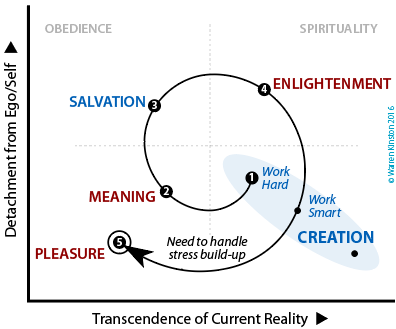Stage-5: Pleasure — Recuperate!
Rationale

The focuses on yourself. As a Mode kicking off Cycle-2, it enables coping by ensuring personal recovery from the silent build-up of inner stressful states.
To this point, all has been intrinsically stressful. Working smart () can still be physically, mentally and emotionally stressful. Applying values () is never simple and straightforward. Consideration for others () always makes emotional demands. While the ENLIGHTENMENT maxims () to be calm, tolerant and accepting may soothe to a degree, actual emotional and intellectual demands are not reduced.
Refusal to Recuperate is a Failure of Coping
Denial of stress and the need for recuperation is common. But the consequence is that a person is likely to escape in dysfunctional ways. Use of intoxicants—drugs and alcohol—is common, and associated with eating unhealthy foods, barely exercising, and missing sleep. This escapism can impact on family and private life, compounding physical and emotional stresses. The last resort, that operates unconsciously, is an accident or illness that lands a person in hospital and forcibly prevents work. ![]() Karoshi
Karoshi
Values & Assumptions
Promoting Survival
Essence: Recuperate regularly
Recuperation must take place on a regular basis and long before any signs of exhaustion appear. This need is reflected in the notion of the Sabbath: even God rested on the 7th day after his 6 days of creation-work μ1). Regularly working nights and weekends to meet deadlines is dangerous. There is no merit in waiting until you are overwhelmed, or illness strikes.
Benefit: Recovery of energies
Continuous stress depletes energies. Deliberate recuperation enables an unconscious and natural healing process. Recuperations normally occurs on a daily basis by sleeping properly and waking refreshed. We can force ourselves to keep working just as we can force ourselves to stay awake, but then energies will not recover.
Means: Rest and recreation
Removal from the stressful environment is the primary requirement. This can occur simply by switching off at home, but healthy vacations are often worthwhile. For most people, eating, drinking and sun-bathing in the company of family and friends generates feelings of peace and warmth. Pleasure also comes from stress-free activities like walking, swimming or golfing.
Handling the Socio-physical Environment
Participation: Explain experiences
Given a welcoming atmosphere, being able to talk about events and how you feel typically reduces stress. This might be possible regularly after work so that frustrations do not interfere with sleep.
Interaction: Associate with positive people
Camaraderie at work leads to trust and enjoyment at work or in any other team activity. If it is not possible to avoid unpleasant relationships at work (e.g. from a controlling boss, difficult colleagues, awkward customers), then socializing outside the work environment becomes particularly important. Foster a supportive family and friends who are positive about life.
Individualization: Select suitable pleasures
Everyone is different. Recreation will be stressful if it makes demands not unlike the work-place: so a group cruise with numerous scheduled trips and forced socializing may be exhausting, while a strenuous activity, like mountain-climbing, may be restful.
Channeling Your Functioning
Endurance: based on Experimenting
.
Limitations
With incorporation values from of , stresses intrinsic to coping in Cycle-1 can be brought under regular and immediate control.
However the is a safety valve. It is self-centred and superficial. There is a need to be able to reduce stress while actively at work and to support coping without escaping. The final two modes provide for this.
Guidance from comes next because there is social environment support and the requirements are tangible and specific.
Moving on…
- Continue to Stage 6: Obedience Mode.
Originally posted: 9-Dec-2022. Last updated: 28-Mar-2023.